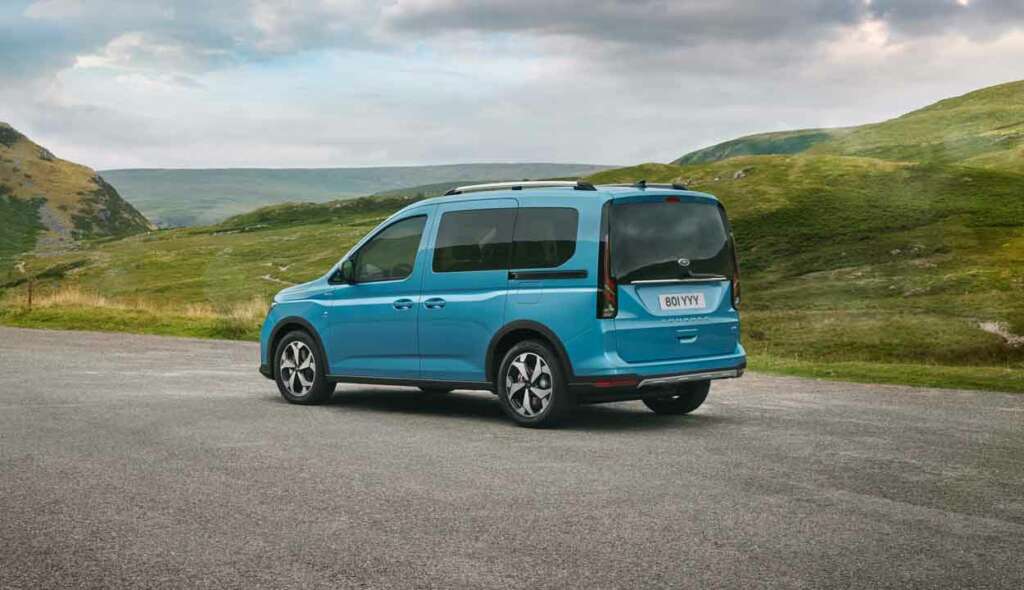Say hello to…
…the car version of the Ford Transit Connect mid-size van which receives a subtle name change from the commercial vehicle with the replacement of the word Transit, with Tourneo.
The Tourneo Connect is available in two lengths, regular and Grand – which means it’s a seven-seater, up from five.
The range is relatively simple to understand. Alongside the two wheelbases, there’s two engines to choose from; a 114hp 1.5 petrol and a 122hp 2.0-litre diesel. And if those engines don’t sound like the usual Ford units, that’s because the Tourneo Connect shares its underpinnings with the Volkswagen Caddy.
On top of those choices there are also three trim levels (although entry level Trend is on the way next year).
- Trend
- Titanium
- Active
Trend includes twin side sliding doors, powered and heated door mirrors, auto wipers, auto lights, 2x USB sockets, manual aircon, lane keeping, 17-inch steel wheels plus front and rear parking sensors.
Standard equipment on the Titanium version adds keyless start, 16-inch alloys, heated front seats, uprated infotainment system, tinted rear windows and roof rails.
Above Titanium, the Active then gains a rugged bodykit, removable waste bin and 17-inch alloys.

Is The Ford Tourneo Connect Suitable For My Fleet
Aside from the high CO2 figure and associated 35% benefit-in-kind tax band, which would really necessitate going for a cash option, the Tourneo Connect, particularly in Grand seven-seat form has some serious fleet appeal. It’s one of the lowest P11D seven-seaters on the market and favours practicality above all else. It even has a decent sized boot behind the third row of seats, which isn’t something that most larger SUV-shaped seven-seaters have.
The commercial vehicle roots also mean the car version will be similarly hard-wearing and reliable.

Leasing A Ford Tourneo Connect
Intelligent Car Leasing is offering the seven-seat Grand Tourneo Connect in Active trim for £524 a month on a 3+36 contract with 20,000 miles a year. Gensen Reports predicts a maintenance cost of £50 a month and the Class 1A NIC will be £87 a month.

Driving A Ford Tourneo Connect
Being initially designed as a van, but then adding seats and a better interior, is a good way of creating a large people carrier that’s durable and comfortable to use.
Sliding rear side doors are super useful in tight parking spaces, even if a top-hinge rear door is less useful in that respect. However, that top-hinge rear boot lid is great for keeping the rain off when you can open it.
There’s good if not amazing middle-row and rear-row leg room for passengers, but it’s still fine for adults.
Both rows also fold down, although not into the floor like car or SUV based seven seaters. But that’s not so important when there’s still vast amount of room in the back.
To drive, the Tourneo Connect can be summarised in one word; easy. The large glass area means there’s good visibility and the ride comfort is excellent. There’s some body roll if you’re enthusiastic in the corners, but that’s not what this car’s about.
The only downsides to the driving experience is the power delivery of the 1.5-litre petrol engine. A better choice for this car would be the 2.0-litre diesel which delivers its shove more smoothly and over what feels like more of the rev range.
The diesel’s gearbox is also much more enjoyable to use.
As well as VW underpinnings for the engine, Ford also uses the VW infotainment system which is known for being slow and glitchy – which was exactly how we found the screen in the Grand Tourneo Connect.
Overall, though, the Tourneo Connect is one of those cars where it’s so incredibly practical that if you need to carry seven people regularly or lots of luggage, it just works. Which is how it should be; fuss-free and good value.

FleetandLeasing.com Verdict On The Ford Tourneo Connect
Go for the seven-seat with the diesel engine for a near-perfect budget people carrier.

Ford Tourneo Connect
- Model: Grand Tourneo Connect Active 1.5 manual FWD
- Power: 114hp
- Torque: n/a
- Max speed: n/a
- 0-62mph: n/a
- Official fuel figure: 42.8mpg
- Test fuel figure: 37.7mpg
- CO2 emissions: 150g/km
- BIK tax band 2022/23: 35%

